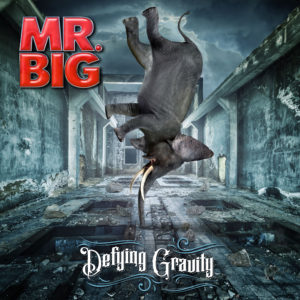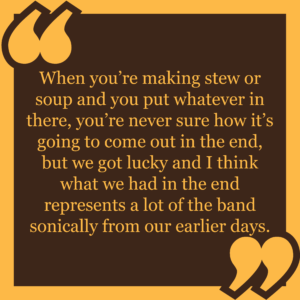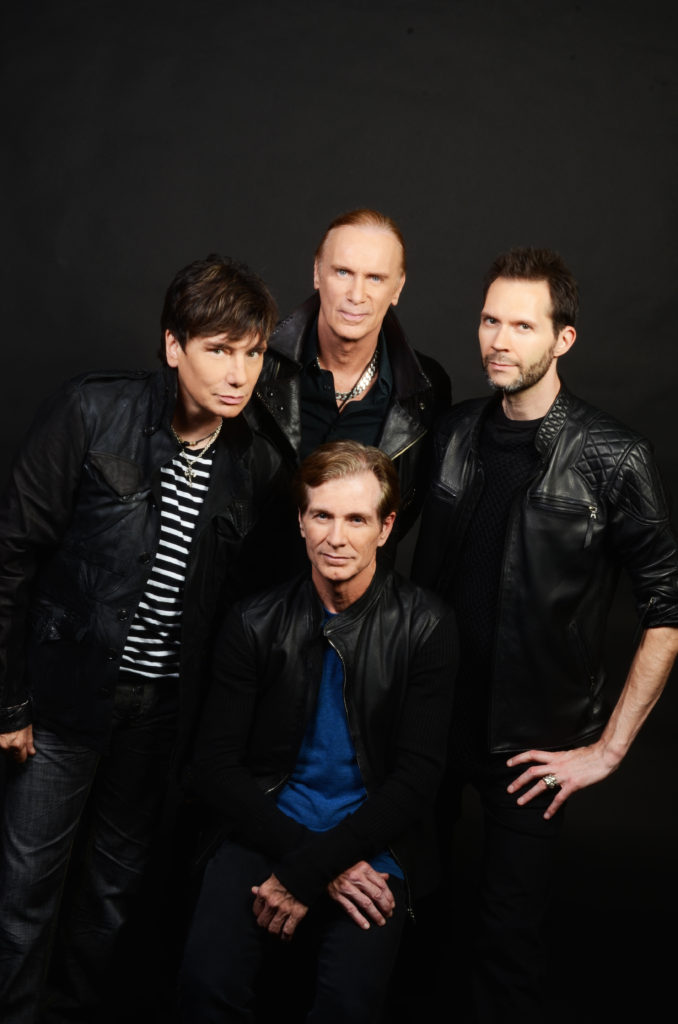 Anyone who listened to the radio in 1991 or watched MTV in the age of actual music videos has emphatically sung along with Mr. Big’s “To Be with You,” the hit single from their platinum-selling sophomore album “Lean Into It.” Nearly three decades later, the band is continuing to write, record, and tour the world and doing so on their own terms now that the music industry has been flipped on its head. Their ninth studio album, “Defying Gravity,” is set for release July 7.
Anyone who listened to the radio in 1991 or watched MTV in the age of actual music videos has emphatically sung along with Mr. Big’s “To Be with You,” the hit single from their platinum-selling sophomore album “Lean Into It.” Nearly three decades later, the band is continuing to write, record, and tour the world and doing so on their own terms now that the music industry has been flipped on its head. Their ninth studio album, “Defying Gravity,” is set for release July 7.
We recently sat down with bass player Billy Sheehan to discuss how their record label originally despised “Lean Into It,” the process that went into recording their new album, and how being crushed to death by those who adore you may not be the worst way to go.
TrunkSpace: When the band first got together, did you ever think you’d still be talking about Mr. Big almost 30 years later?
Sheehan: Well, I guess in the back of your mind, when you’re putting a band together you hope that it’s THE band and it’s going to stay together forever and your kids are going to hang out together, but it doesn’t always work out EXACTLY that way. But we came pretty close. We’re still here. We had a little break for a few years, but we were back together in 2009 just like we were when we started. I’m really pleased. I’m a fan of a lot of bands and a lot of music and I’m always disturbed when I hear that they don’t like each other and stay in separate hotels and have different tour buses and don’t speak to each other and they don’t sound check together. It’s like, “C’mon, if you’re up on stage having fun, that doesn’t happen off the stage?” (Laughter) Fortunately I’m not a good enough actor to make it to fake it like that, so we really do enjoy hanging. We have a good time together and performing on stage. We’re not faking it. When it looks like we’re having a good time, we actually are. So that lead to a longevity that we’re extending into 2017 and we’re still enjoying it. And in many ways, enjoying it even more.
TrunkSpace: So much has changed in the industry both in terms of how it operates and how people consume their music. Has that changed the experience for you guys?
Sheehan: Well, in some ways, some things haven’t changed much because we had an ethic early on that we were in touch with people. We’d get fan mail, we’d write back. I’d throw a couple of pics in an envelope and we’d always send it back. To this day I’ll get an email from somebody that says, “Back in 1984 you sent me a Talas bumper sticker.” (Laughter) It’s good that now that we have the Internet we can directly communicate with everybody. And generally on Facebook and via email and several different formats, I respond to everything I can. It’s an overwhelming task, but I go at it pretty heavily to make sure that I respond to people. So that part of the business has remained kind of the same for us, however of course, the record business as we know it is pretty much gone. There’s no big budgets. Fortunately for us we don’t need a big budget to make a record. We did this in six days. We can do the inexpensive version, which is almost better for us because we actually play, so going in and playing is always, for us, superior than piecing things together in different cities. That’s exemplified on this record, of course.
But yeah, things are different. I think that in some ways they’re actually better because the one thing that you can’t substitute is a live performance. You can fake it with  a lot of digital trickery in the studio. You can pitch correct vocals. You can punch in and punch out and fix timing and fix errors easily after the fact if you need to. We don’t rely on that. Occasionally once in a while there’s a thing that we just have to change. There’s no two ways about it. That ONE note… there’s no way that can stand, so we’ve got to go in and fix it, but… it’s a microscopic amount. We rely on what we do live and because of that live performance, and because it can’t be downloaded, we’ll always have something that we can do that is alive and fresh. And being in a room of your peers and people of like mind as an audience member and seeing a band that you love, that experience… you can’t do that in virtual reality. You can’t do that as a download. You’ve got to be there and you’ve got to see it and smell it and feel it. That’s what we do. That’s what we’ve always done, so in spite of everything changing around us, fortunately it has kind of come back to a situation where the thing that we do best, in my humble opinion, or the thing that we love best rather… is the thing that’s really happening today in many ways.
a lot of digital trickery in the studio. You can pitch correct vocals. You can punch in and punch out and fix timing and fix errors easily after the fact if you need to. We don’t rely on that. Occasionally once in a while there’s a thing that we just have to change. There’s no two ways about it. That ONE note… there’s no way that can stand, so we’ve got to go in and fix it, but… it’s a microscopic amount. We rely on what we do live and because of that live performance, and because it can’t be downloaded, we’ll always have something that we can do that is alive and fresh. And being in a room of your peers and people of like mind as an audience member and seeing a band that you love, that experience… you can’t do that in virtual reality. You can’t do that as a download. You’ve got to be there and you’ve got to see it and smell it and feel it. That’s what we do. That’s what we’ve always done, so in spite of everything changing around us, fortunately it has kind of come back to a situation where the thing that we do best, in my humble opinion, or the thing that we love best rather… is the thing that’s really happening today in many ways.
TrunkSpace: During that time when the labels were in control by way of being in control of the money, did that mean that they also had more of a say over the creative? In the case of Mr. Big, did they try to squeeze themselves into what you were doing in terms of songwriting and recording?
Sheehan: We did have a lot of pressure. Fortunately for Mr. Big, our manager was a guy named Herbie Herbert. He was a legend in the music business. In the Woodstock movie, he’s seen moving Carlos Santana’s amps around. He’s one of the founding fathers of many aspects of the music business that we know of today, so he had a lot of power. When we presented “Lean Into It,” the album with “To Be with You” and “Green-Tinted” and all of those songs on it, we presented it to the label and they HATED it. They despised it. They were not going to release it. They wanted us to go back in and start over again. Fortunately we had our manager Herbie who went into the offices of Atlantic Records and got into a, literally, screaming shouting match with the then president, Mr. Doug Morris. He finally got them to agree to release it, but they said, “We’ll release it, but we’re not going to do anything. We’re not going to have anything to do with it. We’re not going to promote it. We’re not going to do anything. You’re on your own. Fuck you, get out of here.” (Laughter) And that’s how we launched “Lean Into It.” Fortunately our manager was powerful enough that he knew the right people to get us the right airplay and he got us on the right tours. Eventually he found the right promotional people to get “To Be with You” to be played on the radio and then BANG, we had a hit record. All due to our manager. Completely.
So that helped us in many ways, to keep a powerful manager. It helped us to keep that influence of the label off our backs. We’d do our best to cooperate because we liked our label. We liked Atlantic Records and I don’t dislike Doug Morris. He’s a very successful music guy. But fortunately we didn’t have a lot of pressure. It got to the level to where they would strongly suggest things, but we didn’t necessarily have to do it. We would do it sometimes to keep the peace to some degree, but fortunately we were in a great situation with our management.
TrunkSpace: Did the label want “Lean Into It” to be more like something else that was released around that time?
Sheehan: I don’t even know what their idea was, but I remember we were in the middle of doing interviews… we were doing interviews for the “Lean Into It” record, talking about the songs and all that good stuff. We had just delivered the record to the label and now the publicity was starting and all of a sudden I heard, “Billy, I’ve got to talk to you for a minute. They’re not going to release the record.” (Laughter) I go, “Whaaaat?!?!” (Laughter) So all hell broke lose and Herbie flew to New York and they literally had to call security over the argument that had ensued in the office. But in the end, we got our way. Thank you, Herbie!
TrunkSpace: So with “Defying Gravity” being your ninth album, what did you guys want to bring to it that you didn’t bring on the previous eight? Was there something new that you wanted to try or perhaps a different approach?
Sheehan: Well, what’s old is new again and the fact that we brought our original producer in, Kevin Elson. He did our first four records with us. We had our greatest success with him and amazing times from the beginning of the band, right on up to our greatest success. He’s a dear friend and a wonderful guy and a legendary producer. He grew up with and did the live sound for Lynyrd Skynyrd. He was on the plane with them that crashed, survived, and Herbie hired him instantly to do all of Journey’s live mixing and production of their records. He’s quite a storied and legendary guy with amazing ears and just a wonderful sweet man. So, the problem that it brought with it, as we started reminiscing about the stories back in the old days and laughing about it, we go, “Wait, we’ve got to shut up! We’ve only got six days to do this record! We better hurry up!” (Laughter)
So that was one thing that we wanted to bring into this record. We didn’t know how it would turn out, but I think we have a record that sonically is a little bit more like our earlier records, but still has a lot of the features that are modern in 2017. A good combination of the two. You never know when you combine things. When you’re making stew or soup and you put whatever in there, you’re never sure how it’s going to come out in the end, but we got lucky and I think what we had in the end represents a lot of the band sonically from our earlier days. There’s no subwoofer, deep, low end bass that was non-existent back in those days. Sonically it’s more in tune with a regular rock record as opposed to a digital feast or cornucopia using sonic trickery. It’s a rock record and I think that’s good for us to do. I think with Mr. Big, that’s the kind of band we are and that’s the kind of record that I think works best on us.
TrunkSpace: So in terms of the songwriting itself, how much time spans the creation of the tracks on the album? How far back do they go?
Sheehan: We went back a few months. We got together… myself, Pat, and Paul… and did what we initially did. We come up with some ideas and songs and send them up to Eric and see what he can add or subtract from them and then he sends them back down to us. We did that a bunch of times. But when we went into the studio, we didn’t have 11 complete songs, by any means. We had two or three that were pretty much done, but every time we tracked a new song we kind of had to map it out all new right then and there, which again like I said earlier, it was kind of good to have that pressure on you because you can take unlimited time on any project and when you do it just seems to drag on and lose it’s spirit and lose it’s soul and it’s fire. So, we could see each other playing and I’d look up and it would look like Pat’s going into the part where the chord changes, so I better change there too and by chance I’d get it right and it would work out. We arranged a lot on the fly and I think that was a beneficial thing also.
TrunkSpace: Did part of that arranging on the fly magic also play into having Kevin back with you guys?
Sheehan: Very much. He knows when to put his hands on and when to take his hands off. When things are going smooth and fine, he sits back and just makes sure everything is sounding right. When things slow down, he’ll say, “Okay, maybe this part and maybe not that and maybe this and not that.” He’s never dictatorial and always pleasant and easy and open to suggestion. It’s a real joy to work with someone like that. I’ve worked with producers that it’s just, “It’s my way or just leave!” and that’s not really conducive to an experience that you’ll want to reproduce on the road. (Laughter)

TrunkSpace: You’ve worked with many other artists over the course of your career, including David Lee Roth. In working with different people and on different projects, does each become it’s own unique experience or does it all start to feel like the same process?
Sheehan: It can be very different. Some aspects of it are the same. Basically you want to get your rythm section… the drums and the bass… that arrangement down and then you start to flesh our more guitar parts and vocal things. That’s kind of a basic. There’s some things that make sense. But everybody’s fingerprint, cornea, DNA… they’re all different and that adds up to a different personality and a different dynamic. When you get in a room full of four people and change one, the whole thing is different again. It doesn’t seem like it should be that way, but it really is quite different. As a fan I know every time I saw a band change members, it always threw me. Sometimes it was okay, but not very often. I always like the original chemistry that I fell in love with. So, similarly when you’re putting a record together in the studio, there’s a dynamic that happens with every person that’s involved. Even with people who are kind of on the outside and not really involved, they still have an influence on how it goes down. So it seems to me that, to your point, that it is very different is the more accurate one.
TrunkSpace: A lot of times people are not always comfortable with the mass exposure they receive when something like “Lean Into It” hits on such a massive, global scale. How did you view all of the attention at the time?
Sheehan: Well, we rolled around in it. We put our heads under the water and it was incredible. It was an amazing experience. And it happened all over the world too. We were number one in 14 countries. There were about four or five times where we were actually in danger… legitimate physical danger from crowds. We showed up in Singapore one time and they announced what flight we were coming in on and there were about 4,000 to 5,000 people at the airport and no one to get us. We were supposed to take cabs to our hotel, so we had to stay behind customs and then the police showed up and they tried to get us into cars. Kids were pushing and the police had billy clubs and pistols hit the floor as we ran. We managed to get there and there were kids camping out in the lobby. And this happened a bunch of times. We didn’t want to see anyone get hurt, so that was a concern of ours, but I guess if you’re going to die, dying being crushed by people who love you would not be the worst way to go. (Laughter)


